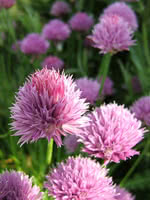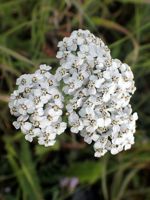Mon-Fri 9am - 5pm Mountain time
Chives vs Yarrow
Allium schoenoprasum
Achillea borealis (Previously Achillea millefolium)
NOT AVAILABLE THIS SEASON - MIGHT RETURN
SOLD OUT
Chives are small bulbous perennials commonly used as herbs in cooking for a mild onion like flavour. Chives also add ornamental benefits to your yard with their tubular grass-like leaves and clusters of pale purple flowers. The flower heads can also be used as a garnish or in oils.
It is best to harvest Chives from the base to maintain the attractive clumps. If the flowers are not dead-headed, it will self-seed. Planting our overwintered chives will give you a head start in your vegetable garden.
Yarrow is a herbaceous, native wildflower that is found across Canada. It features large, flat clusters of tiny white flowers. The blooms attract a variety of pollinators, making it an ideal choice for pollinator gardens. While partial shade is tolerated, the best flowering occurs in full sun. Yarrow is resistant to deer and rabbits, making it both a beautiful and practical addition to your landscape.
The entire plant is edible, but leaves and flowers are most commonly consumed. They have a strong licorice scent and a mild sweet flavor that is similar to tarragon. Yarrow leaves can also be used as a natural insect repellent.
It is important to plant Yarrow in the right place, it can spread quickly via both rhizomes and self-seeding. Deadheading the spent flowers will extend the bloom season and can help limit self-seeding.
Chives Quick Facts
Yarrow Quick Facts
Toxicity: toxic to dogs, cats, and horses

